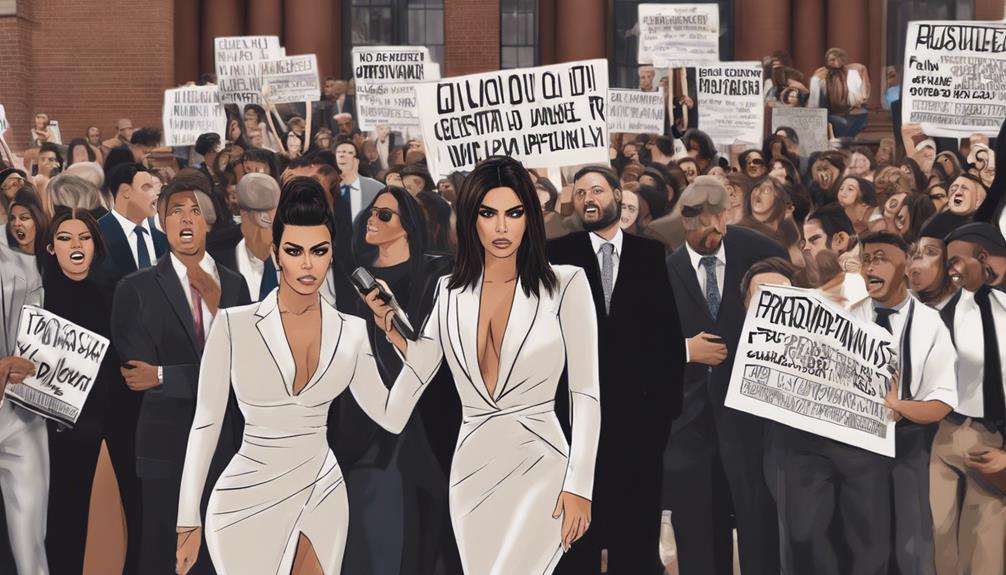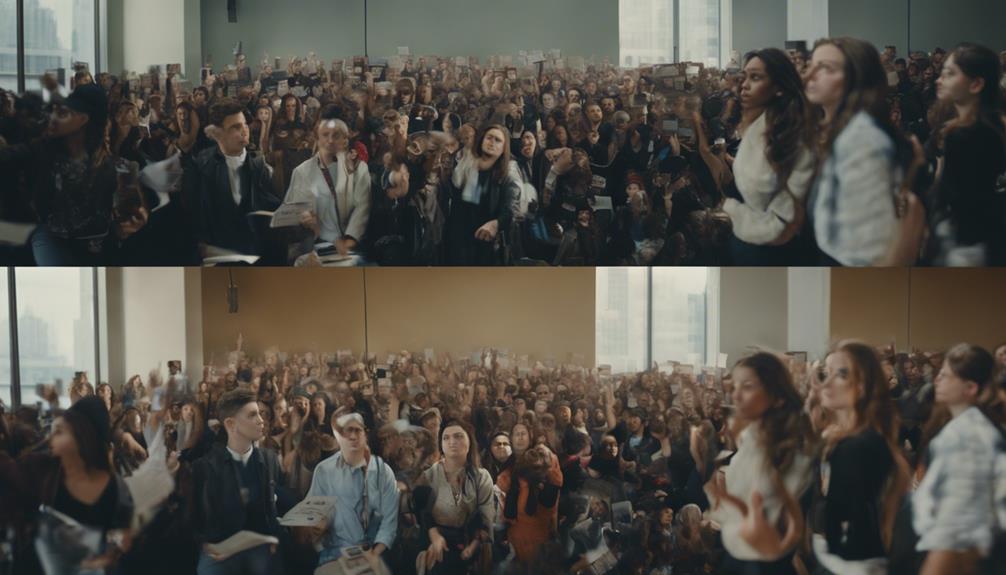Kim Kardashian's recent seminar at Harvard Business School has stirred significant controversy. Critics on social media questioned her credentials as a business expert, arguing that her presence overshadows qualified voices in the field. Supporters point to her successful entrepreneurial ventures, like Skims, which is valued at around $3.2 billion. The backlash highlights a broader debate about the role of celebrity in business education and whether their influence is warranted. This event has prompted discussions on the criteria for selecting guest speakers in academia and the shifting landscape of business leadership. There's much more to the evolving dialogue around celebrity entrepreneurs.
Key Takeaways
- Kim Kardashian's seminar at Harvard Business School faced backlash over her credibility as a business expert in the direct-to-consumer space.
- Critics argued that Kardashian's presence overshadowed qualified voices in business education, raising concerns about meritocracy.
- Supporters defended her entrepreneurial success, highlighting Skims' rapid growth and valuation increase to $3.2 billion.
- The event sparked a broader debate about the role of celebrity entrepreneurs in business education and consumer trust.
Event Overview
Kim Kardashian and Jens Grede engaged business students at Harvard Business School in a nearly two-hour seminar focused on direct-to-consumer strategies for Skims.
They discussed the marketing approaches that propelled the brand's success, along with the challenges they faced in an evolving retail landscape.
Kardashian shared her insights on consumer engagement, emphasizing the importance of understanding customer needs and preferences.
Grede complemented her perspective by highlighting the operational strategies that helped Skims scale effectively.
The seminar provided students with real-world applications of business concepts, showcasing how a celebrity can leverage personal branding to drive entrepreneurial success.
Although the event attracted media attention, it remained unfilmed, allowing for an intimate and candid dialogue between the speakers and attendees.
Public Reaction

Despite the high-profile nature of the event, many on social media expressed significant backlash regarding Kardashian's invitation to speak, questioning her credibility as a business expert.
Critics argued that her celebrity status overshadowed more qualified voices in the business community. Some users voiced dissatisfaction over the tuition costs associated with attending an event featuring a non-traditional speaker like Kardashian.
In contrast, her supporters defended her entrepreneurial journey, asserting that she's built successful brands through innovative strategies.
This divide in public opinion underscores the broader debate about the role of celebrity in business education and whether such figures should be given platforms in academic settings.
Business Achievements

Building a successful brand, Kardashian has seen Skims valued at approximately $3.2 billion following a recent $240 million financing round. This impressive valuation has doubled within the last year, reflecting the brand's rapid growth and market appeal.
Kardashian holds majority equity stakes in both Skims and KKW Beauty, further solidifying her status as a formidable entrepreneur. In 2020, she sold a 20% stake in KKW Beauty for $200 million, showcasing her ability to capitalize on her ventures.
With an estimated net worth of $1.4 billion, Kardashian's financial success highlights her effective business strategies and marketing prowess. Her achievements illustrate not only her personal success but also the potential for celebrities to thrive in the entrepreneurial landscape.
Media Coverage

Media coverage of the Harvard seminar spotlighted both the criticism and support surrounding Kardashian's business acumen. Articles emphasized the divide in public opinion, with some questioning her credibility as a speaker, while others applauded her entrepreneurial success. The media also discussed the implications of celebrity culture in business education, contrasting traditional business figures with influencers like Kardashian. These discussions further fueled the ongoing debate about the intersection of celebrity and business, and the impact it has on the public’s perception of success and achievement. Some even drew comparisons between Kardashian’s Harvard seminar and Elon Musk’s exposed address, highlighting the scrutiny and speculation that surrounds high-profile individuals entering the business education sphere. Overall, the media coverage shed light on the complexities and debates surrounding the influence of celebrities in the business world. The media coverage also delved into the impact of Kardashian’s influence on young entrepreneurs and the message it sends about the importance of personal brand and social media presence in business. Additionally, the discussion extended to the potential for celebrities to use their platform to raise awareness on important issues, such as mental health struggles, as seen with Britney’s mental health struggles. These conversations highlighted the evolving role of celebrities in shaping public discourse and the blurred lines between entertainment, business, and social responsibility.
| Criticism | Support |
|---|---|
| Lack of credibility | Successful business achievements |
| High tuition costs for speaker | Inspiring entrepreneurial journey |
| Celebrity over qualifications | Relevance in modern business |
| Concerns about academic integrity | Engaging younger audiences |
This coverage reflects the ongoing debate about what constitutes valid expertise in a rapidly evolving business landscape.
Broader Implications

The Harvard seminar featuring Kim Kardashian prompts a reevaluation of celebrity influence in business education and the evolving definitions of expertise in the field.
As the lines blur between traditional business leaders and celebrity entrepreneurs, the value of firsthand experience versus academic credentials comes under scrutiny.
This event highlights how social media amplifies celebrity voices, shaping public perception and consumer behavior.
Kardashian's presence at a prestigious institution raises questions about the criteria for guest speakers, challenging the norms of what qualifies as business expertise.
Furthermore, it sparks a broader conversation about the potential impact of celebrity endorsements on brand loyalty and consumer trust, signaling a shift in how future business leaders might define success in an increasingly media-driven landscape.
Conclusion
In the end, Kardashian's Harvard appearance serves as a reflection of the adage, 'There's no such thing as bad publicity.'
While some may question her qualifications, her entrepreneurial journey and the success of Skims can't be ignored.
This controversy not only highlights the tensions between celebrity culture and traditional business education but also prompts a re-evaluation of what constitutes expertise in today's fast-paced, media-driven world.
The debate may continue, but Kardashian's impact is undeniable.









